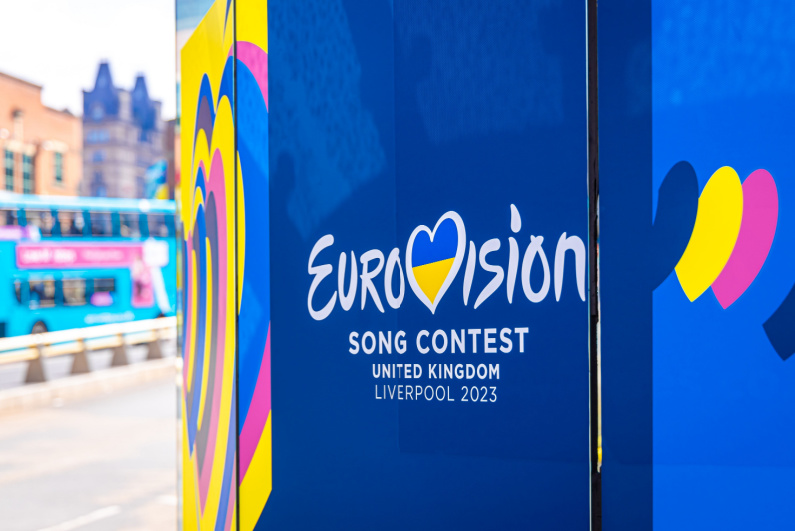The time has come
With the Eurovision Song Contest 2023 almost upon us, it’s time to make your snacks, get comfy on the couch, and place your bets as the best singers in Europe do battle.
Since Ukraine is unable to host the tournament this year due to the ongoing conflict with Russia, Eurovision will take place in the UK for a record ninth time. The Grand Final is due to begin on Saturday at the M&S Bank Arena in Liverpool where 37 countries will face off in the singing competition.
these stats could help you secure a serious payday
As Eurovision fans get their last-minute bets in, VegasSlotsOnline News has taken a detailed look at some of the main factors involved to see if we can help you predict who might come out on top. From home-field advantage to the nationality of past winners, these stats could help you secure a serious payday.
The stage is set:
Home-field advantage
As we all know, home-field advantage is a major factor in sports leagues around the globe. In the English Premier League, for instance, home teams win around 49% of games in comparison to 29% of away teams. So, does this same benefit apply to the host nation of Eurovision, in this year’s case the UK?
At first glance, hosting the Eurovision Song Contest doesn’t appear to have much impact on your chances of winning. The host nation has won just six of the 64 competitions to date, corresponding to around 9% of the victors due to the four joint champions in 1969.
half of the 52 countries that have ever participated in the competition have won
That said, it’s important to note that each competition features a vast number of countries – a number that has increased over time. Only half of the 52 countries that have ever participated in the competition have won, of which hosts make up 19% – an interesting figure given that only 26 countries have actually hosted it.
The first win by a host came in 1956 by Switzerland, followed by Spain, Luxembourg, Israel, and Ireland. In fact, Ireland famously became the only country to win Eurovision three times in a row in the ‘90s, twice as the host. The last came courtesy of the singing duo Paul Harrington and Charlie McGettigan in 1994.
Interestingly though, no host nation has won Eurovision since Ireland’s last victory in 1994, when the number of participants shot up by seven – the largest increase since the first edition of the event. This suggests, as is perhaps obvious, that the larger number of countries has made it more difficult (if not impossible so far) for a host to win.
Ultimately, based on the data, it seems the UK has just as much chance as the rest of the field to secure victory this year regardless of its hosting duties. The country will hope that it can build on its second-place finish in 2022 through Mae Muller. At odds of +5000, it certainly could be worth a punt:
The winning profile
For every Eurovision, a single winner must emerge. To help you predict the possible nationality, age, and gender of that victor, VSO News has taken a look at the Eurovision acts that have won the competition by the highest points margin in history. Essentially, these are the best Eurovision winners of all time.
the highest winning margin came from Alexander Rybak of Norway
The average points margin of all of our top winners is 101 points, meaning they all crushed the competition. Of our top ten winners, the highest winning margin came from Alexander Rybak of Norway, who at the age of 23 in 2009 won by a staggering 169 points.
The only country to pop up more than once in that top list is Ukraine. The reigning champion is at odds of +750 to take victory for the second time in a row this year. The nation won last year with Kalush Orchestra by a points margin of 147, the second-highest of all time. Ukraine also made the list in 2016 for securing a 71-point lead with Jamala and her song 1944
If Ukraine’s previous success doesn’t tempt you, then there are some other factors to consider. The most common song type among the top winners are ballads, which secured wins in 2012, 2016, and 2017 with an average margin of 109. This year, Italy could be an outside shot with its ballad entry from Marco Mengoni, Due Vite (+5000):
In regard to gender, the top winners are evenly split between males and females. Meanwhile, the average age is about 30 years old. Of the top contenders for Eurovision 2023, Kaarija is the closest to this age. The 29-year-old Finnish singer is hoping to set the stage alight with rap pop hit Cha Cha Cha. He is the second-favorite to take the win at +260:
Notably, one of the major contenders for 2023 actually appears on our top winners list. Loreen, Sweden’s hopeful this year, has already won Eurovision once in 2012 by a points margin of 113. This year she will hope that her new song Tattoo will see the same success. Sportsbooks certainly think it might, placing her favorite at odds of -163:
Record of success
Now we’ve looked at home-field advantage and winning characteristics, it’s time for the simplest marker of success – past wins by nationality.
Helped by its spate of three successive wins in the 1990s, Ireland is the most successful competitor in Eurovision history. The Emerald Isle has taken home the trophy a record seven times. Unfortunately, this information will do little to help us in predicting this year’s winner given that Irish hopeful Wild Youth was knocked out in the semi-final this week.
Sweden has won Eurovision six times, the first in 1975
Next up, the list of winning countries takes us to Scandinavia. Sweden has won Eurovision six times, the first in 1975 and the last coming seven years ago through singer-songwriter Jamala. As mentioned above, Sweden’s hopeful this year has already contributed to that win tally with her victory in 2012. Sportsbooks believe she has a good shot at the same success in 2023.
After Sweden, the next best countries are a little harder to separate. Four nations are tied with the third-highest number of wins at five each. This includes the Netherlands, France, UK, and Luxembourg. Of these, only France and the UK will take part in the Grand Final this year, and France has the best chance of victory according to sportsbooks. La Zarra has odds of +1700 to take the win:
As an outside shot this year, Israel has four wins in Eurovision history, the last of those coming in 2018 through Netta Barzilai with a 95-point margin. The country is through to the Grand Final again in 2023 with the 22-year-old pop star Noa Kirel and her hit song, Unicorn. Sportsbooks have priced her at +1800 to take the trophy:
So, there you have it – all the advice you could possibly need to make the best betting picks for this year’s Eurovision Song Contest. Have fun, and check out VSO News’ article on the best Eurovision-themed online slots.




